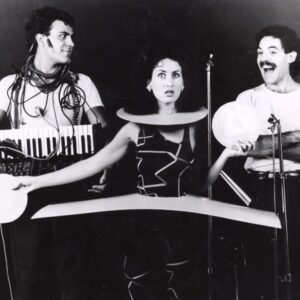“I have always approached music in a self-taught manner, and this may have allowed me to cultivate the resilience that would prove essential later on. I started by playing a little bit of everything: drums, guitar, accordion, and a small electric organ with 15 keys,
on which I invented my own little tunes. I continued on my own: what was a passion for me was just an annoying, useless pastime to my family, who hoped I would grow out of it soon.

When I was 13, something changed my life: it was summer, I was on vacation, and I fell in love with a girl my age. During that time, I listened to the only cassette I had, “Io sono nato libero”, an album by Banco del Mutuo Soccorso. The strong emotions the music gave me mixed with the exciting feelings of first love and the sweet kisses in fields filled with the fresh smells of nature.
After that life-changing summer, I played my music for the first time in public with my band at a cinema/theater. The excitement was overwhelming, and I can’t explain it.
That’s when I really started to experiment with music.
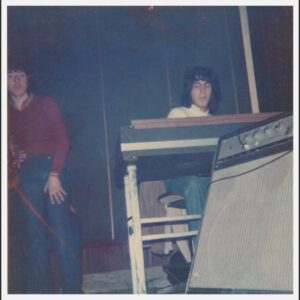
Two years later, as sometimes happens in films, I woke up one morning and decided to study music seriously. So, I began working in the cold storage rooms in Aprilia, loading trucks to pay for music lessons, careful not to hurt my hands, my only assets, which I had come to rely on to escape the house, where music was only a nuisance.
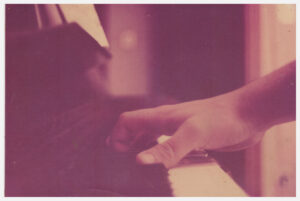
My girlfriend at the time, poor thing, had to come to my house for whole afternoons: while I studied, she did other things and listened. Her father bought a piano to encourage me to study at her house. It was straightforward to convince me… I didn’t have a piano. I was studying on an electric keyboard with only five octaves.
And it didn’t end there. Perhaps because he was a painter, he felt a special kind of solidarity toward me, something that only exists between artists. Knowing I wanted to apply to the conservatory a few years later, he was determined to introduce me to his friend, Flavio Benedetti Michelangeli, the cousin of the more famous Arturo, and a teacher at the Santa Cecilia Conservatory.

It was one of the worst days of my young life: the teacher harshly criticized me in front of my girlfriend and her stunned father, who believed in me sincerely. According to him, there was no hope for me in music. I didn’t speak for a couple of hours, with a lump in my throat and a pain inside that I’ll let you imagine.
I had my conservatory entrance exams just a few days later. At the same time, I had the high school graduation exam, for which I had studied very little, focusing instead on preparing for the conservatory exams. I risked failing both: no high school diploma and no conservatory.
However, I passed the high school exams and entered the conservatory with the highest marks, both in piano and composition and later in electronic music.
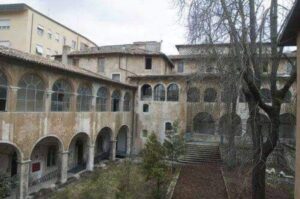
It would have been wonderful to convey my feelings of that moment, but words would never suffice. I can only tell you about that beautiful afternoon when I, my girlfriend, and her father, the artist, sat together in front of the phone. I listened to the artist’s voice, speaking to Michelangeli, confirming my admission to the conservatory. At the same time, I enjoyed a fine Cuban cigar. The teacher’s response was a garbled reply, something I no longer cared to hear.
What would have become of me if I had believed Benedetti Michelangeli?
How many Benedetti Michelangeli are out there?
How many passions and lives do they ruin?
It took me seven years of study at the conservatory to understand it; seven years in which I constantly questioned whether the method my teachers spoke about — all that separating into specialized, fragmented fields — was indeed music. The music I felt every day outside the conservatory gave me goosebumps, while everything felt dusty and old inside the conservatory
One exception was my first composition teacher, a student who was filling in for someone
At our first lesson, he asked me:
“Why do you want to study composition?”
I replied:
“Because I have ideas but don’t have the technique to develop them properly.”
He smiled and said:
“Then you’ve chosen the wrong place.”
I don’t know why, but I smiled too. That teacher inspired trust in me, and I liked his response.
I only understood it years later when I realized no school can give you a composer’s license.
Either your works exist, or they don’t.
Ten years later, that wonderful, honest, and humble teacher came to me, asking me to teach him how to compose modern music, the same kind I was now making a living from. I could be the master of my master only because I had learned things that could not be studied anywhere but through experience.
Meanwhile, it became clearer that technique is just a primary support when composing. When music becomes your daily work, you realize that you must always start with an idea — a word that doesn’t exist in any composition manual because it’s commonly assumed that ideas are a divine gift: either you have them, or you don’t. This is false.
Creativity is within all human beings, and it was made clear to me by another significant encounter a few years later with Professor Fagioli and his Theory of Human Birth and the search for Collective Analysis, which explains the biological origins of human thought and thus of imagination. There is no divine spark; only human beings, more or less creative and capable of representing.
One must learn to listen, but this word is yet to be discovered in some educational settings. Amidst many misconceptions, there were many truths: the millions of pages of music written by composers, the actual books to study from, thousands of records to listen to, and many people inventing and playing music. These are the true sources of knowledge.
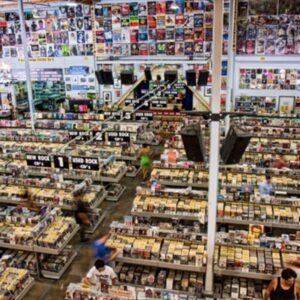
“To become a musician of my time, I had to manage on my own…”
(Tony Carnevale)
(Tony Carnevale)
From 1978 to 1985, Tony Carnevale studied Composition at the A. Casella Conservatory in L’Aquila, under Paolo Giuliani, Giampaolo Chiti, Alessandro Sbordoni, and Giancarlo Bizzi. He studied Electronic Music with Michelangelo Lupone, Piano with Ketty Spagnoli and Luciana Ricotti, and Choral Conducting with Giorgio Kirschner. He also participated in Orchestra Conducting lessons with Nicola Samale.
On July 14, 1985, he graduated with a degree in Choral Music and Choral Conducting from the Luigi Cherubini Conservatory in Florence.
In 1985 and 1987, Tony earned teaching certifications in music for middle schools (placing second) and secondary schools (placing first).
During this time, he also began his concert career:
- 1982: Villa Borghese, Rome. Tost Moderno by the group Valeriana Export. Composition, piano, and acting.
- 1984: Rasgamela Theater, Ciampino (RM). Koloree. Composition, artistic direction, and music production of the soundtrack, piano.
- 1985 – Sala d’organo del Conservatorio di musica A. Casella, L’Aquila. “Live experience” per pianoforte e nastro magnetico. Composizione, pianoforte solista e nastro magnetico.
- 1985: Organ Hall, A. Casella Conservatory, L’Aquila. Live experience for piano and tape recorder. Composition, solo piano, and tape recorder. Un segno.
- 1986: Basilica of Massenzio. Massenzio 86. Composition, artistic direction, and music production of original jingles for the event MassenzioX”.
- 1986: Palazzo della Cancelleria, Rome. Primarie relazioni (Bianchini) – Electronic Tracks – 9th Festival of Vertical Music. Soloist on electronic keyboards and digital sound systems.
“Difficile imbattersi in un artista complesso e indecifrabile come Tony Carnevale, proveniente dall’universo classico ma con una passionalità ed un approccio musicale anticonvenzionali, inusuali per chi, come lui, possiede un diploma in Musica Corale e Direzione di Coro”
(Metropoli Rock Italia – 02/1993)
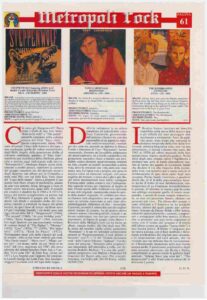
SOUNDTRACK
Viale Piemonte 47 - Cologno Monzese (Mi)
(+39) 02 94155942

